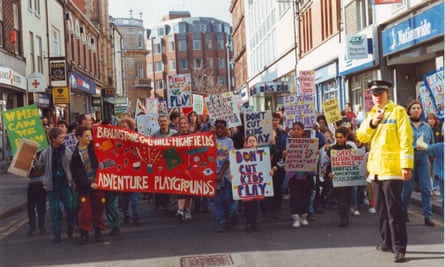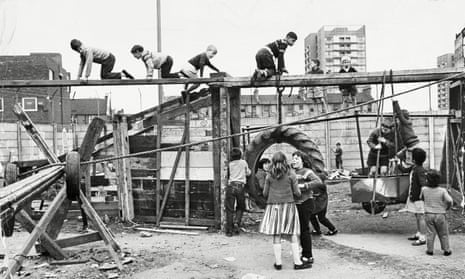On a muggy afternoon in Oval, south London, children leave their local primary school and run straight to the Triangle Adventure Playground, clambering on to large wooden beams and grabbing ropes to swing from. This tiny slice of wilderness is no bigger than a suburban garden, but for the local children who live in the nearby tower blocks and social housing estates, it is a slice of freedom from their everyday urban jungle.
“This is where these children learn to be people,” says chair of the playground Jim Clancey, looking at a group of eight- and nine-year-olds as they negotiate turns on a large tyre swing. The centre is open for children aged between six and 16, some “who have no gardens, who live in tower blocks [and] who have nowhere to go after school”, he says.
A small emergency fund will help keep the gates open for the longer summer days, but the centre say they need £5,000 a month to stay operation. The Triangle is not alone – a number of the UK’s oldest adventure playgrounds are at risk of closing or losing tens of thousands of pounds in funding as government budget cuts force local authorities to slash youth services.
Of 142 playgrounds mapped in England in 2010 – which emerged in English cities after the devastation of the second world war – many have already seen the council drastically cut core funding.
In Leicester, senior playworker Kevin Sherriff, who is leading the campaign to save the city’s nine adventure playgrounds, told the Guardian: “Me and the other playworkers – we are police, educators, and social services ... If we don’t engage [these children] in a positive way they are stuck at home or out at risk on the street. The relationship between [our] staff and inner city kids is vital.”
Oval’s Triangle Adventure Playground is the oldest of its kind in the UK, opening in the late 1950s. But today, like many local services for young people, its future is under threat. The land is leased from Lambeth council who, forced to make cuts of over 50% across all their services, have had to halt their core funding of the playground.
As the Triangle puts its hope in a crowdfunding campaign, Clancey worries about what would happen to the local children if it closes. “This is a social service, we have got parents who couldn’t work if it wasn’t for us,” he adds, proud that no child has ever been charged to play.
Jack , 18, drops by as Clancey gets collecting tins ready for an evening of fundraising, . “I have been coming here since I was five,” he says. “ Now I like to see the little ones here, safe and not out on the street … this place needs to be here or where would those little ones be?”

Adventure play, or junk play as it was first known, arrived in English cities after the second world war, when many children constructed their own play spaces in bomb sites, making swings and dens with broken beams and shattered doors. Then, children’s rights activist Lady Marjory Allen visited Denmark and was shown a radical new playground in the neighbourhood of Emdrup designed by architect Carl Theodor Sorenson: the space made use of junk materials and invited children to use their imaginations.
Lady Allen imported this idea of semi-formalised play to Britain and advocated that children be given space to take risks, unlike in static playgrounds. She famously said: “Better a broken bone than a broken spirit.”
Play workers were, and still are, an essential part of these spaces, giving children as young as the age of six the chance to explore with supervision. Once at Triangle a mother brought the staff a cake. “She said her autistic son came here on his own and someone asked him if he would like to play. That had never happened to him before,” says Clancy.
London Play, a charity which describes itself as “defenders and deliverers of play opportunities for London”, says that Watford, Southwark and Brent have all lost their adventure play services. Not far from Oval in Peckham Rye, the senior play worker at the site there was recently made redundant after 16 years.
In 2015, Wandsworth council sold a beloved adventure playground in Battersea Park to a commercial company called Go Ape. An adult and two children wanting to use it now would have to pay £60. The council and Go Ape did build another playground in it’s place, but it is static and unsupervised.
A hundred miles north of the Triangle, the Highfields Adventure Playground in Leicester is also fighting for its life after 40 years. Like Clancey, senior play worker Sherriff has devoted his life to the philosophy of junk play. “Kids need to be able to take risks, they are born lairy and we know it’s good for them,” he says.
Waiting to hear if planned 50% funding cuts will go ahead at the nine adventure playgrounds across Leicester, Sherriff is worried that auditors will overlook the benefits. “We are a shining example of what adventure playgrounds can do here. In this city we have 30,000 children living in poverty and most of them are living near an adventure playground.”

Sheriff has also noticed a greater number of older teenagers arriving at the playground as youth clubs vanish: “We are police, educators, social workers. In a city the alternative is that these young people would be unsupervised on the street, or stuck at home in their room with a games console.”
Wendy Russell, a lecturer specialising in play at Gloucester University who has just finished a project collecting memories of adventure playgrounds in Bristol and Gloucester, says cities are becoming increasingly hostile to young people. “Children are out of place in the public realm, they are not welcome on the street. These once poor areas are gentrified now and priorities are different. There is a wariness of getting involved with the non-middle class kids”.
In Leicester the fight to stay afloat is taking time away from maintaining the playgrounds. “We used to spend winters scrounging. We would go up to Grimsby and get fishing nets, then I made tree houses out of them by sewing them together and we would hoist them up between the trees,” Sherriff remembers. “When the weather was cold we would light big fires and me and the kids would just sit out round them. But I’m more and more in the office now.”
Leicester City Council must make savings of £55m across their budget before 2019, on top of £100m already saved. Sarah Russell is assistant city mayor of Leicester and responsible for children and families. She says the council are doing what they can to help the playgrounds stay open in response to a campaign by the children who use them.
“We have agreed to take time to work with them and look at what [non-council] external funding they might be able to get. It’s a horrendously difficult thing to put forward, it absolutely isn’t why I came into local government. We are doing our best to manage ever decreasing resources,” Russell says.
The vision for adventure play is not yet dead. Lambeth Council points out that in the borough there are still adventure playgrounds open, but with no statutory duty to fund them they will always be vulnerable to austerity.
For Clancey in south London, the worst possible outcome would be if funds ran so low there was no money for play workers to supervise and encourage the children. “I can see what would happen, we would get replaced with some of those outdoor exercise bikes for adults, a swing and a slide for the kids.”
Follow Guardian Cities on Twitter and Facebook to join the discussion, and explore our archive here

Comments (…)
Sign in or create your Guardian account to join the discussion